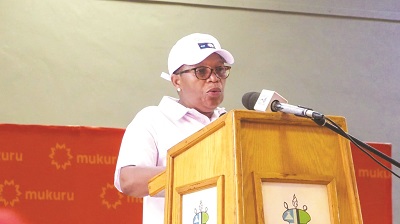By: Kamohelo Ntsebeng
MASERU
On April 4th 2024, the Leseli Financial Literacy Institute hosts a financial literacy event in collaboration with the National University of Lesotho (NUL). It hosts this with the intent to educate students on improving financial awareness and literacy.
It also focuses on advancing it and its inclusiveness in Lesotho. This took place at NUL campus, Maseru, with the primary aim to celebrate financial literacy month – April.
Executive director of Leseli Financial Literacy Institute, Libuseng Titi says financial literacy is important and yet complicated. It lays down the ground work for informed decision making and economic empowerment, without limiting one’s understanding of the numbers or budget management.
It equips individuals with knowledge and skills needed to manage for effective financial management, and stratifying for future financial journeys. Financial literacy is important aspect of success in financial inclusion initiatives. It is about making informed decisions that shape financial well-being while contributing positively to the community as a whole.
Being financial literate does not only mean one must be educated about financial inclusion but, they should also be able to apply their knowledge in their day to day lifestyle. That way, one can then conclude on their financial literacy.
A lot of people might be wondering about where they might start in order to improve their financial literacy. One crucial step towards improving financial health is creating a budget; to stick by it. This helps the individual to keep track of their income and expenses, thus identifying areas that may or may not need relevant adjustments.
It is possible to achieve the desired lifestyle as it will be supported by the realization of a manageable budget and if not, such a budget should be adjusted until it helps the owner to start planning for the fitting set of financial life goals.
Setting financial goals within a budget framework help individuals to prioritize spending, building savings and working towards long term financial stability.
However one might still be in question of why is it so important to budget and also invest their money in other companies or businesses. The real world where people live in demands one to have a backup plan in case of any sort of unanticipated surge of expenses.
Budgeting and investing are vital for financial stability and growth. It helps to manage daily expenses while enabling savings effort for future goals, on the same token still investing. This eventually helps the individual realize wealth overtime.
It is advisable for people who have not yet embarked on the journey of investing and budgeting to start first by tracking their expenses and setting achievable savings goals. Gradually, they can launch themselves into different investment options and, seeking professional advice to begin and maintain profitable investments.
Financial literacy caters for every group part of society. Financial literacy is the right of every member of society. It is for the shared vision of realizing informed decision making about their budgeting, saving and managing debts. Disadvantaged people also have to learn about financial literacy as this can break poverty cycles, improve financial well-being and advance the achievement of more financial goals by acquiring financial literacy skills.
Many people have side hustles but does it mean they are financially literate? Having side hustles does not indicate financial literacy but it shows that such an individual has an entrepreneurial spirit and resourcefulness within them because being financially literate involves understanding various aspects of personal finances including budgeting, saving, investing and debt management.
Multiple sources of income do contribute massively to income generation and yet, being financially literate, one must know how to manage their income effectively so as to build their wealth and achieve their financial goals they have set for themselves.
It is important for every business owner to be financially literate. This is to ensure good decision making.
ALSO: Recording daily transactions is very crucial for every business as this provides a clear picture of the business’s financial health, facilitates accurate financial reporting and aids in decision making. It helps businesses monitor cash flow, trends and assess the profitability of their operations. It also ensures compliances with accounting standards and tax regulations, contributing to the overall success and sustainability of the business.


